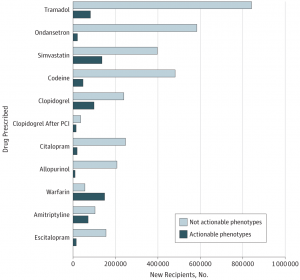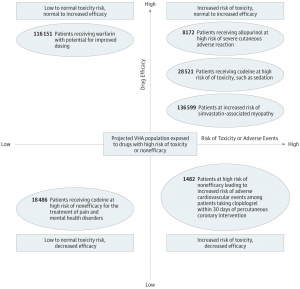The VA already conducts human leukocyte antigen testing prior to prescribing abacavir to avoid a potentially fatal reaction. HLA type also impacts response to pegylated interferon, carbamazepine, oxcarbazepine, phenytoin and allopurinol, with adverse effects ranging from hypersensitivity reaction to severe cutaneous adverse reactions such as Stevens-Johnson syndrome or toxic epidermal necrolysis.
“Similarly, if a variant influences the dose—a perfect example is warfarin—testing up front can minimize the time spent finding a proper dose and making adjustments,” Tuteja told U.S. Medicine.
The study found that two-thirds of veterans with European ancestry were likely to have actionable genetic variants for warfarin dosing. The authors noted that “veterans of African ancestry also are likely to have variants that could guide dosing, although different variants are likely to influence warfarin response in this population.”
Common mutations can reduce the effectiveness of medications or increase the risk of side effects of medications frequently prescribed to veterans. The researchers estimated that 8.9% of the nearly one million veterans prescribed tramadol for analgesia would have an inadequate response to therapy. Of the 533,928 veterans newly prescribed simvastatin, 25.6% were projected to have a variant in SLC01B1 that put them at risk of myopathy at any dose, and 1 in 4 of those were prescribed an 80 mg initial dose that would further increase their risk.
A genetic mutation that affects processing of a particular drug only matters for veterans prescribed that drug, though, which makes determining who should be tested and when more challenging.
Continue Reading:




